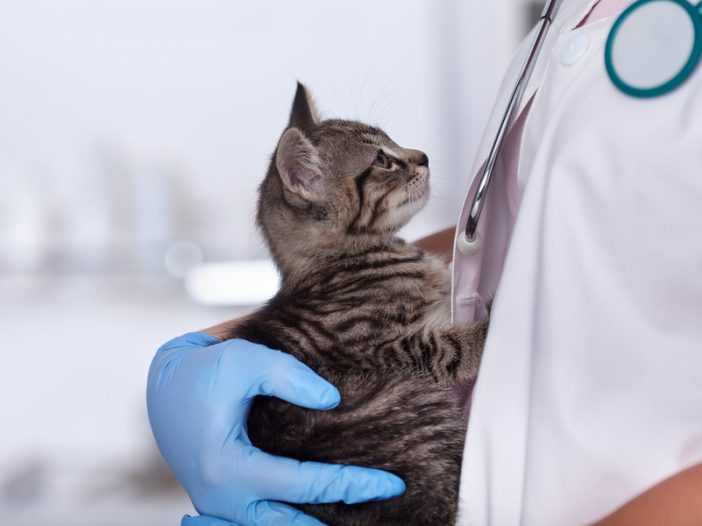
The day after Christmas started normally for a day in the clinic… with an emergency. Petey had been vomiting since Christmas Eve. By the time he made it to my exam room, he was looking miserable.
“Were there any Christmas parties?” I asked Mom. “Any holiday treats he could have gotten into?”
“No,” she said, “but he does like to chew on his blankets.”
I suppressed a groan. The day after a holiday was always busy, and now I needed to get x-rays. I took Petey back to radiology and got two abdominal views. I groaned again. There, superimposed over his kidney was a dilated loop of intestine with a striated appearance, highly suggestive of a cloth foreign body.
Back to the exam room I went, pulling up the images on the computer for Mom to see. I pointed to the objectional area and explained that Petey needed surgery.
“There’s no way it will pass on its own?” a family member asked.
I shrugged my shoulders. “I never say never,” I advised them, “but I would be very surprised.”
I gave them a ballpark estimate on what surgery would cost and watched as the color drained out of Mom’s face.
“It’s not that I don’t technically have the money,” she explained to me. “But Petey’s 13 already. If he was two, I’d do it no question, but to put that big of a strain on our budget at his age…”
My gut twisted painfully. Every fiber of my being wanted to take Petey to surgery and fix him. Mom was clearly struggling with this decision too, but she had a family to take care of and Petey was only one part of it.
I hated the decision that had been made, but I understood it. Yes, I could save Petey from this problem and no, age is not a disease, but Petey had already lived a long life and his time left with his family was going to be limited no matter what we did. Just a few years ago, I’d spent thousands of dollars on surgery for my own 14-year-old dog when she developed an obstructive mucocele. With her gallbladder out, the problem was solved. And four months later, she had metastatic mammary carcinoma that no amount of money and medical treatment could save her from.
I told Mom that I understood and respected her decision. Together, we decided that, though we knew it was a hail Mary, we would give Petey 24 hours of IV fluids and gatroprotectants.
As I accompanied Mom out of the room, she turned to me, “Thank you for not judging me for this,” she said and despite my concern for Petey, I felt a warmth inside. Though the chances were small that I would be able to help Petey, I was helping his family.
The following day, Petey looked brighter and he hadn’t vomited at all. We retook the radiographs and the obvious obstruction was no longer visible. The bad news was, Petey refused to eat nor had he had a bowel movement.
We decided to send Petey home. His family knew there was a very good chance the obstruction was still present and he would start vomiting again once the Cerenia wore off, but there was a chance and he was feeling better for the time being.
I spent the next day and a half waiting for the shoe to drop; waiting to hear that Petey was vomiting again. A little over 24 hours after Petey was discharged, I got the call.
“Petey pooped out a tampon and now he’s acting totally normal.” I almost cried with relief.
Mom’s words from the day before rung in my ears. “Thank you for not judging me.” But what if I had judged her? What if I had scolded her for not being a responsible pet owner? For not preparing financially for an emergency like this? What if I had made her feel terrible for her decision? Would I have been able to guilt her into letting me do surgery on Petey? Probably not.
It would have been much more likely that she would have lost all trust in me and decided to euthanize Petey right away, or to take him home against medical advice. Mom would have left feeling terrible at herself and angry at me. I would have spent days stewing in anger and resentment over her unwillingness to care for her pet, and Petey would probably be dead.
I saved a life that day, but not with my surgical skills. My medical training didn’t provide me with the abilities that made a difference. Instead, it was my empathy that won the day. It was my capacity to set aside my judgment and work with a client – even when they didn’t do what I wanted them to.
It can be easy to get caught up in what we believe is right and to judge others for not having the same priorities and beliefs that we do. But being inflexible, demanding, and judgmental are not traits that endear us to others and win them over to our side. Alienating our clients won’t get them to do what we want. So, set aside your judgement and see what a difference you can make.
The views and opinions expressed in this article are those of the author and do not necessarily reflect the position of the DrAndyRoark.com editorial team.